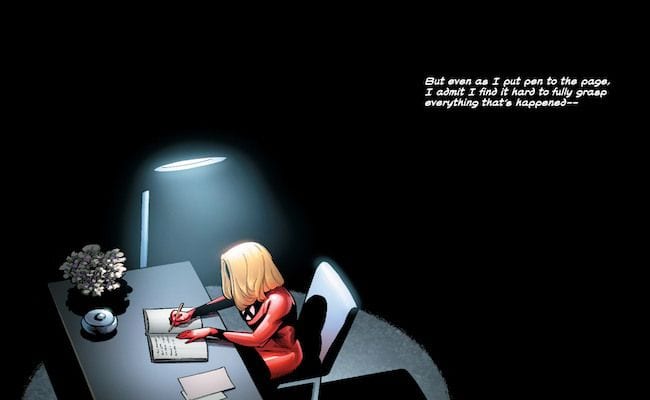
James Robinson and Leonard Kirk’s Fantastic Four #1 is one of those reorienting issues. It’s the type of book whereby a new creative team, given not only a high profile property but, also, a new #1, is looking to place their authorial stamp. It’s a restatement of core concepts and the unveiling of potential threads and themes and it is the variety of comic many readers are growing increasingly familiar with.
Given that the series was relaunched a little under two years ago, and, between DC and Marvel over the past several years, new #1’s have landed on store shelves like locust on wheat, I’m not sure a fresh start is really needed, or wanted. In fact, judging from this first issue, while sleek looking, briskly paced, and lusciously illustrated, by Kirk, and colored, courtesy of Jesus Aburtov, it feels entirely too familiar, stale, and paint-by-numbersish.
It’s not unlike wearing the same pair of underwear two days in a row: comforting but something you don’t really want to discuss with others. And that’s a shame, considering the creative team’s pedigree.
That’s doubly so for Robinson. Few writers are more nostalgic and conscious of how to use the past, both on and off the page. Going to bat for Marvel’s ur-book, the genius seed for the whole universe, should have been a slam dunk. Though it’s been quite a while, Robinson’s signature work still remains DC’s Starman from the 90s. That was a book published at a very fruitful and vibrant time for the publisher where the past was celebrated. Former sidekicks were taking over their mentors’ mantle and there was a line wide sense of progression, of embracing the past so as to move into the future. Starman was at the forefront of that trend and Robinson’s love for what had come before while using it for new, intriguing ends made for an utterly compelling series.
With DC jettisoning this past due to The New 52, I can imagine Robinson’s desire to up-sticks and join up with the company that still sees its long, shared history as an asset, rather than a hindrance.
Still, Fantastic Four #1 seems too beholden to its history to make much of an impact. Part of this stems from the fact, as first issues do, that all characters need to be introduced. Understandably, #1’s have a lot riding on them and can potentially bring in new readers. You can’t expect to succeed by tossing them into the deep end right away. Even though that’s how I prefer my comics, I still understand the necessity for a gradual dunk.
But this is all shallow end.

From the introduction of the team, to the battle against pre-Marvel relic Fin Fang Foom, to the personal dynamics between characters, this is all well-trod ground. Too well-trod. There are a few vague inklings of something greater behind the scenes and, perhaps, Robinson and crew just didn’t hit the gas hard enough this time around. This is the start of a new volume and a new story arc. There’s a lot of pieces to juggle.
Nevertheless, the biggest sin is that this first issue feels like a fax from the past. All superhero comics from the Big Two rely on a sense of implied movement. Any progression, at least on titles as big as this, is either illusionary or temporary. Sure, there have been exceptions to this rule but, increasingly, the toys are always put right back to where they were. All the sand from the box is cleaned off and they’re put back into the packaging so a sense of continuity is maintained and the next group of writers and artists can play with them all intact.
These books are predicated on this arrangement. Good creators can play nicely. Great ones can make you forget there’s any play at all.
Robinson and Kirk just haven’t carved out their niche. They’re trying to recreate the past instead of simply respecting it. The toys are still in their packaging and I don’t think so sudden a relaunch can afford to play so tamely. Again, there are slight hints that something greater might be in the pipe but there just isn’t enough here to justify why the reset button needed to be hit, again, so soon.


![Call for Papers: All Things Reconsidered [MUSIC] May-August 2024](https://www.popmatters.com/wp-content/uploads/2024/04/all-things-reconsidered-call-music-may-2024-720x380.jpg)



